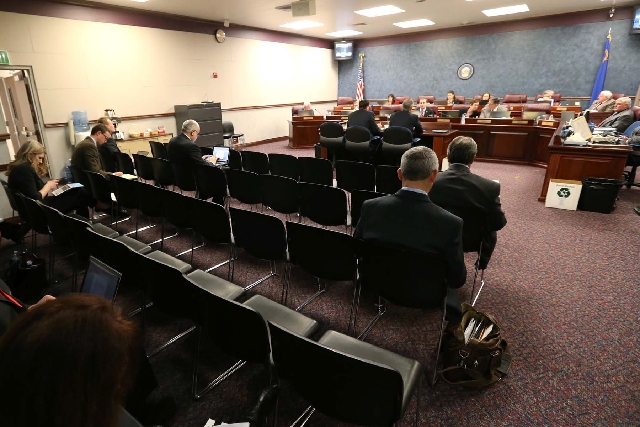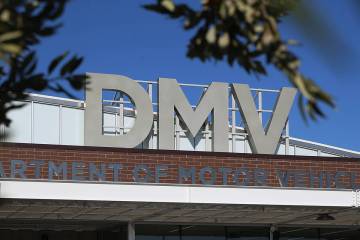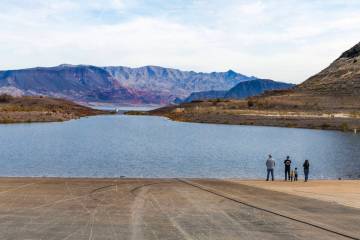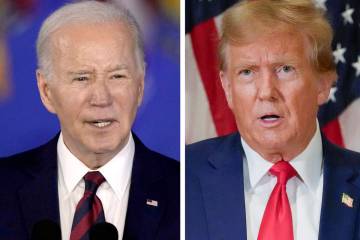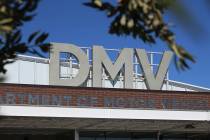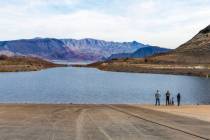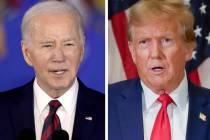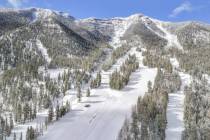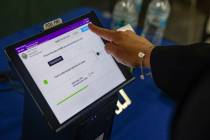Nevada Legislature sees quiet session so far
CARSON CITY — When the Senate Transportation Committee met March 13 to discuss Sen. Don Gustavson’s bill to increase the speed limit to 85 mph, just a handful of Nevadans showed up in the hearing room. Testimony was given by five people, none of them private citizens who just like to drive fast.
A March 8 Senate Judiciary hearing on a bill to levy $25 fines against children under 18 who smoke cigarettes drew three speakers, none of them teens, while an Assembly Education Committee hearing on a bill to punish high school seniors who cheat on tests drew four speakers, but no actual students.
Has the public apathy about government grown so strong that Nevadans don’t even care about bills that would affect large numbers of people, including themselves?
Legislators say no. State Sen. James Settelmeyer, R-Minden, said a group of students and teachers had wanted to attend his hearing on fining teens who smoke, but couldn’t take time off to attend on school days.
“I am getting twice as much email as last session,” Settelmeyer added.
State Sen. Mark Manendo, D-Las Vegas, chaired the poorly attended hearing on the higher speed limit.
While he had expected more people to attend, he speculated the attendance might have been low because the higher speeds would apply only in limited areas, on Interstate 15 between Craig Road and Mesquite and on most parts of Interstate 80 across Northern Nevada.
“I haven’t been to Mesquite in a decade,” he said. “People realized it would apply in limited areas. If it had been in Las Vegas or Boulder City, hundreds of people would have turned out.”
But Fred Lokken, a political science and Web college professor at Truckee Meadows Community College in Reno, has little doubt that the public attention on this year’s Legislature has dropped.
NO TAX HIKES, NO SPARK
Lokken said Gov. Brian Sandoval’s anti-tax increase position has come through so loud and clear that residents realize legislators, unlike in 2011, won’t be raising taxes this year.
And no bill that requires additional spending can pass unless legislators increase taxes or take funds from an existing state agency budget.
The cost of changing signs to an 80 or 85 mph speed limit would be $750,000 on Interstate 80 alone.
Because the tax issues are what attract many people’s attention, and there might not be much tax debate until just before the session closes in June, Lokken figures citizens also are not paying much attention to nontax issues.
The general public might be listening or watching, but not actually attending or testifying at hearings on bills.
Use of the Legislature’s website that offers audio and visual broadcasts of hearings is up 50 percent — from 42,000 in 2011 to 63,000 in 2013) — but that is not a true comparison, according to legislative staff. That’s because there are nonbroadcast options available when you click on the broadcast link this year.
But there have been many other cases of poor attendance at hearings on bills of general interest.
Two witnesses showed up for a hearing on a bill to decide whether families can obtain the Facebook and email information of deceased relatives.
The list goes on and on. Legislation in the Assembly to require posting calories on fast-food restaurant menus and to outlaw texting while walking across a street. Both drew sparse attendance, and none of the witnesses were average citizens.
Hearings on texting bills were some of the most memorable two years ago. Dozens of people, including teenagers, showed up.
A check of the 1995 Senate Transportation Committee hearing on the bill that increased Nevada’s top-end speed limit to 75 mph shows that 20 people testified, including Chad Dornsife, of the Best Highways Practices Institute. He also testified on the 85 mph speed limit law.
“Twenty years ago the speed limit was a big deal,” Manendo said. “The speed limit was 55 mph and the higher speeds applied to a much broader area. This time (the 85 mph bill) people realized it really didn’t affect them much.”
ANIMAL BILLS THE EXCEPTION
In contrast to reports of sparse attendance on many bills, the Senate Natural Resources Committee hearing on the bill to outlaw Nevada’s 2-year-old bear hunting season drew a crowd of 110, according to the sign-in sheet. And a hearing to outlaw horse tripping attracted 100 people.
Many people do not sign the attendance sheets, so the true attendance could have been double those numbers.
“The animal bills generate a lot of passion,” said Senate Natural Resources Chairman Aaron Ford, D-Las Vegas. “You see hundreds of people show up.”
As chairman, Ford tries to encourage attendance by contacting known supporters and opponents and mentioning in other committees what’s on the agenda for his hearings.
But the way most people learn of controversial hearings is social media, he said. Someone goes on the Internet and uses Facebook, email or other media to hype a hearing that they believe should be attended.
Settelmeyer and Manendo agree. Manendo is an animal rights activist who goes out of his way to use social media and personal connections to draw interest to animal bills.
“The average person on the street doesn’t have time to track every bill,” he said. “But the social media has changed everything.”
Settelmeyer said it is clear to him that the horse tripping hearing attracted people through social media. He showed a reporter his recent email that included dozens of messages from people demanding the Legislature take action to stop the practice. Many of messages came from residents in other states and even foreign countries.
Whether Nevada even has a horse tripping problem is up for debate. Settelmeyer, a rancher, said he never has seen it in Nevada. Ford asked law enforcement officers if it was occurring and was told no.
Supporters, however, released a YouTube video of a Mexican rodeo in Winnemucca in 2011 that showed cowboys trying to lasso the feet of horses. But Hispanic cowboys testified that they were not trying to hurt the horses.
“Just because we don’t have evidence, doesn’t mean it doesn’t exist,” Ford said.
That residents are passionate about animals is clear from the Legislature’s website: leg.state.nv.us. On the right side of the opening page is a link where people can express their views and cast a nonbinding “public vote” on any bill before the Legislature.
As of Friday morning, six of the 10 most popular bills, in terms of citizen votes, dealt with animal issues. Manendo’s Senate Bill 72, which would outlaw horse tripping, had drawn the most public votes, 1,524, with 940 in favor and 584 against.
Senate Minority Leader Michael Roberson’s Senate Bill 245, which would prohibit residents from obtaining potentially dangerous animals, is the fourth most popular bill.
Drawn up after two incidents last year in Las Vegas when chimps escaped from a home, it has received 804 public votes — with only 21 for and 783 against.
“Imagine if there were a dog fighting bill,” Manendo said. “You would have the rooms packed. These aren’t just animal bills. Animals do attack people.”
Contact Capital Bureau Chief Ed Vogel at evogel@reviewjournal.com or 775-687-3901.
HOW TO VOICE YOUR OPINION
■ Go to Legislature’s website: leg.state.nv.us. A list of everything you could possibly want is on the main page.
■ Watch a hearing: Watch or hear any hearing or floor session.
■ Cast a nonbinding "vote" on a bill: Share your opinion on legislative bills.
■ Testify in person: Don’t fly up to Carson City, because most hearings are teleconferenced in the fourth-floor offices of the Sawyer Building in Las Vegas. By law, time must be set aside to allow citizens to testify.
■ Contact your legislator: Call toll-free 486-2626 from Southern Nevada and ask to be connected to any legislator. Expect a secretary to answer. Outside of Clark County, call 1-800-978-2878.
■ Email a legislator. This link will take you to a page where you can get to the list of Senate and Assembly members along with ways to look up your legislators. Or go directly to the Senate or Assembly pages.



